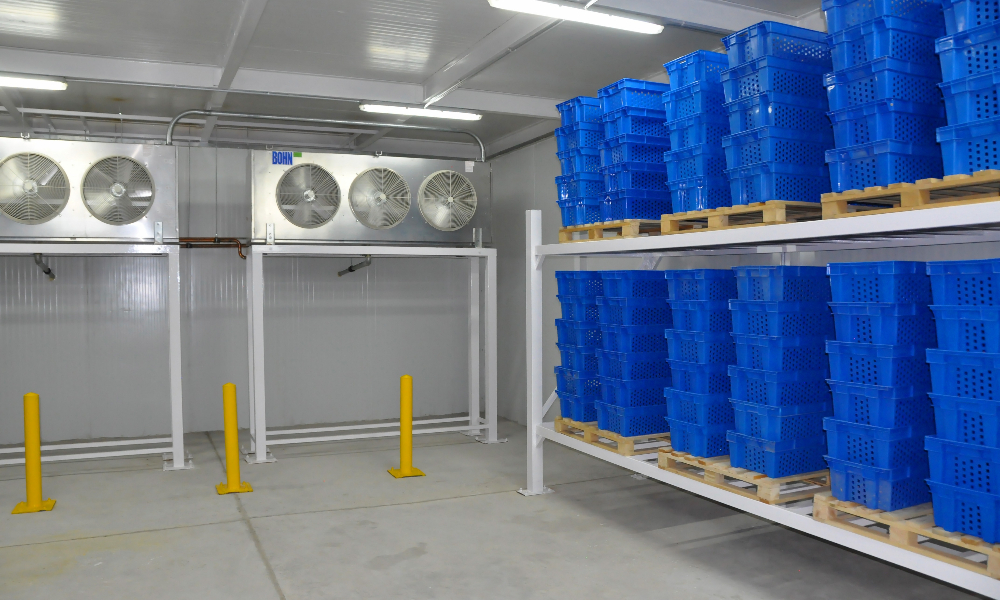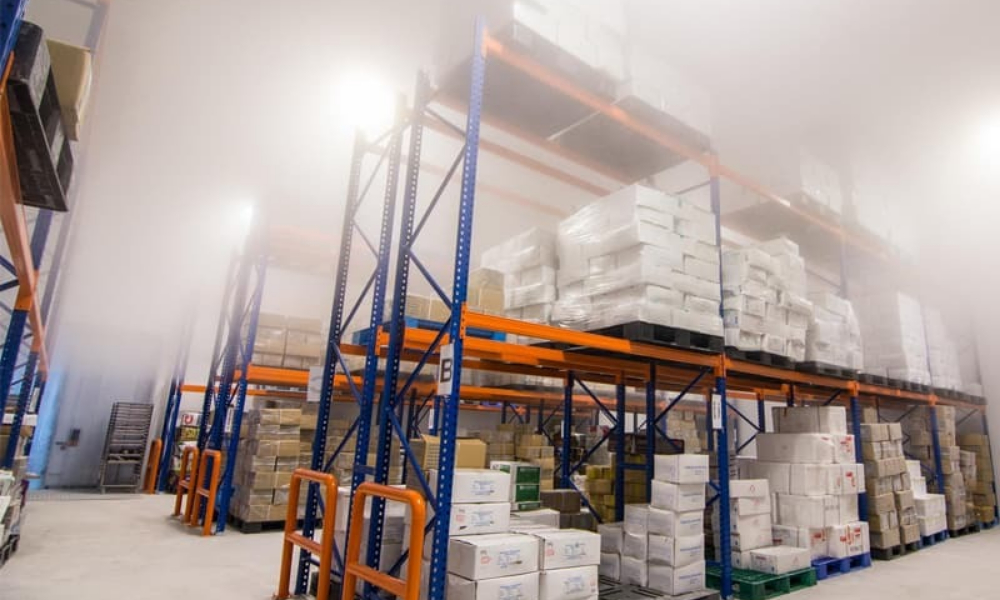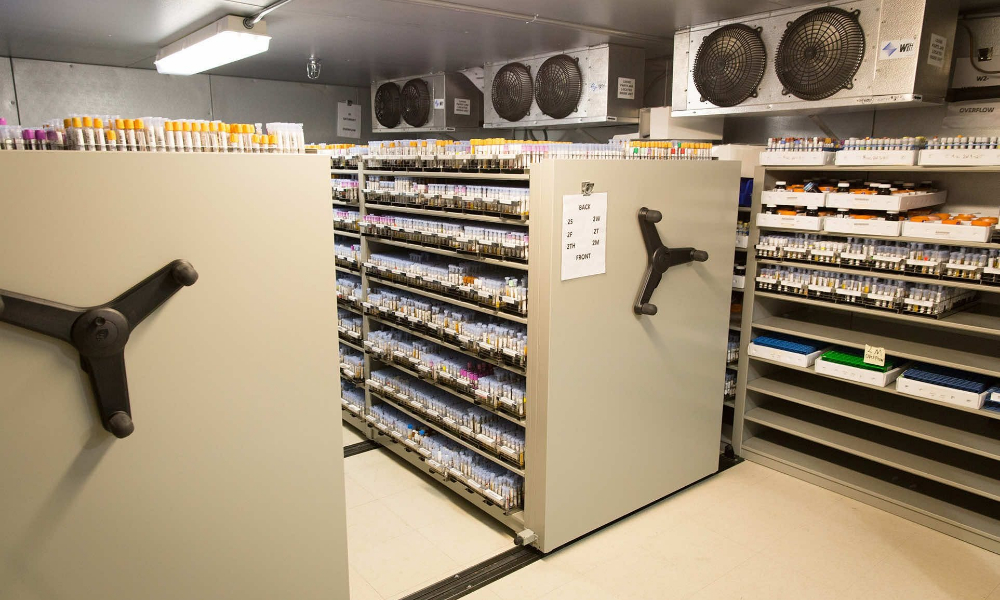Special Conditions for Pharmaceutical Cold Storage
There are significant differences between cold storage for pharmaceuticals and other types of product storage, which are directly related to the type of products and their storage conditions.
One of the main differences is the precise storage conditions required. Pharmaceuticals and medicinal products are highly sensitive and require exact storage conditions, including temperature, humidity, light, and other environmental factors. Therefore, pharmaceutical cold storage facilities are equipped with advanced systems for accurate control and monitoring of temperature, humidity, and other environmental factors, which are crucial for maintaining the quality and safety of pharmaceuticals. On the other hand, other products, such as fruits and vegetables, are less sensitive and can generally tolerate normal temperature and humidity levels.
Control and monitoring systems in pharmaceutical cold storage are also much more advanced. These systems must precisely control and monitor storage conditions to ensure the quality of the pharmaceuticals. Additionally, the pharmaceutical industry has specific standards and regulations for the storage and distribution of drugs that must be adhered to.
The use of advanced equipment and technology is another difference. Due to the higher sensitivity of pharmaceuticals, pharmaceutical cold storage facilities typically use more advanced equipment and technology for precise control and monitoring of storage conditions, such as intelligent monitoring systems and temperature and humidity control systems.
Moreover, there is a greater need for security in pharmaceutical cold storage. Due to the sensitivity of pharmaceuticals and medicinal products, pharmaceutical cold storage facilities require higher security levels to prevent unauthorized access and unwanted changes in storage conditions.
Overall, the key differences between pharmaceutical cold storage and other product cold storage lie in storage conditions, use of technology, and required standards, which must be meticulously followed to ensure the safety and quality of the products.
Pharmaceutical cold storage facilities, as a vital part of the pharmaceutical supply chain, require specific equipment and measures to ensure the preservation of the quality and safety of pharmaceuticals.
Key Measures and Equipment for Pharmaceutical Cold Storage
Temperature and Humidity Logging Systems in Pharmaceutical Cold Storage
These systems are used to monitor and log temperature and humidity conditions in pharmaceutical cold storage. Accurate logging of temperature and humidity with specialized equipment allows for continuous monitoring and alerting in case of any unwanted changes.
Remote Temperature and Humidity Monitoring Systems for Pharmaceutical Cold Storage
These systems allow cold storage managers to remotely monitor temperature and humidity. This capability is provided through online systems and internet communications, allowing managers to view and control storage conditions from anywhere with internet access.
Condensing Unit and Backup Electrical Panels for Pharmaceutical Cold Storage
Having a backup condensing unit is a measure used in pharmaceutical cold storage as a support and backup plan for instances when the working unit fails. This is the heart of the cold storage, and its deactivation even for a few minutes can affect the products inside. If the main unit fails, the backup condensing unit can take over its duties, ensuring the quality of pharmaceuticals and medicinal products in storage. Therefore, this unit is of high importance and is used as a preventive and necessary measure in pharmaceutical cold storage.
Availability of a Technical Team with Professional Technicians 24/7 for Technical Repairs and Addressing Potential Issues in Pharmaceutical Cold Storage
In pharmaceutical cold storage, having a skilled and experienced technician for repairs and troubleshooting is crucial. This individual must have sufficient experience and necessary training to handle technical problems and prevent system failures.
Other Preventive Measures in Pharmaceutical Cold Storage
Besides having a technician for repairs, pharmaceutical cold storage requires measures to prevent system failures. These measures include regular maintenance and preventive repairs, using high-quality and standard equipment, and strictly following the guidelines and recommendations of the equipment manufacturers.
As a result, the above-mentioned equipment and measures are among the most important factors used in pharmaceutical cold storage to ensure the preservation of the quality and safety of pharmaceuticals and medicinal products.
Need for Specific Standards in Pharmaceutical Cold Storage
In the pharmaceutical industry, the storage and distribution of drugs are of great importance and require adherence to specific standards and regulations to ensure the quality, safety, and efficacy of the drugs. One of the most important standards in this industry is Good Manufacturing Practice (GMP) standards. These standards are a set of guidelines and procedures that drug manufacturers must follow to ensure that drugs are produced with quality and safety. GMP standards include points such as cleanliness and hygiene in the production environment, quality control of raw materials and production processes, record-keeping and maintenance of production and testing data, and ensuring necessary corrections and updates in systems and processes.
In contrast, for other products stored in cold storage, the standards may be less stringent. For example, for food products, there are quality and safety standards, but their regulations may be less stringent and different in precision compared to GMP standards in the pharmaceutical industry. These standards focus more on aspects like food quality and safety, proper storage, and public health-related points.
Overall, pharmaceutical industry standards are usually more stringent and comprehensive because drugs directly impact human health and safety, while standards for other products may be less stringent and more general.
Types of Pharmaceutical Cold Storage Based on Temperature
1- Above Zero Cold Storage
One of the important types of cold storage used for storing drugs and medical products. These types of cold storage are primarily designed for keeping products at normal or lower than ambient environmental temperatures (such as room temperature).
For example, pharmaceutical refrigerators are usually maintained at a temperature of 2-8 degrees Celsius. This temperature is typically suitable for storing drugs that require cool storage, such as essential drugs, vaccines, biological drugs, and drugs that are particularly sensitive to temperature.
Hospitals, pharmacies, clinics, and health centers use these types of cold storage to keep drugs and medical products in suitable conditions, ensuring their quality and safety.
2- Below Zero Cold Storage
Usually used for storing drugs and high-risk products in terms of quality and safety maintenance. These cold storages have negative temperatures, allowing drugs and products to be kept at temperatures below zero degrees Celsius. For example, vaccines and biological drugs that require very low temperatures to maintain their effectiveness and safety are stored in these cold storages.
These types of cold storage are used in research centers, hospitals, medical laboratories, and pharmaceutical companies due to their ability to create negative and precise temperatures. These places require safe and reliable storage of drugs and high-risk products, and cold storages with negative temperatures provide this capability.
The temperature of these special drug cold storages is usually in the negative temperature range and may be set a few degrees below zero, typically in the range of -2 to -8 degrees Celsius. These temperatures are very important for maintaining the quality and safety of temperature-sensitive drugs and vaccines. However, some drugs and chemicals sensitive to temperature may need to be stored at much lower temperatures than zero degrees Celsius. For example, some vaccines and therapeutic biological drugs may need to be stored at temperatures much lower than zero degrees Celsius to maintain their activity and safety. These temperatures are usually in the range of -20 to -80 degrees Celsius and are used for experimental, research, and medical purposes.
3- Pharmaceutical Cold Storage with Specific Controlled Temperature
Refrigerated cold storages with controlled temperature equipment have systems that can accurately control and maintain the temperature within the required range. These types of cold storage are suitable for storing temperature-sensitive and high-risk drugs and products in terms of quality and safety maintenance.
These cold storages are used in places such as hospitals, clinics, medical laboratories, pharmaceutical companies, and research centers because there is a need to store temperature-sensitive and high-risk drugs and products. For example, vaccines, biological drugs, serums, and drugs that need a specific temperature to maintain their effectiveness and safety are stored in these cold storages. These cold storages provide the possibility of accurate and safe storage of these drugs, helping to maintain their quality and safety.
The refrigeration and electrical control equipment of these special cold storages can accurately control, log, and analyze the temperature of the storage. Using sensors, thermostats, and electronic thermometers adjusted according to the desired temperature and specific data, they control, log, and analyze the entire system's performance, including temperature and humidity, and detect any deviation from this temperature.
Cooling Systems: These systems usually consist of parts such as compressors, heat exchangers, and cooling units. They are used to maintain the desired temperature in the cold storage and act to cool the environment and prevent excessive heating.
Monitoring Systems: These systems are used to continuously monitor and control the temperature and humidity conditions in the cold storage. They typically have displays showing information about temperature, humidity, and system performance status.
Support Systems: These systems include software backups and spare parts for technical equipment. They are used to maintain the stability of the cold storage operation and prevent the loss of important data and information.
These equipments fully and optimally ensure the appropriate storage conditions in pharmaceutical cold storages and prevent the degradation of medicinal products.





